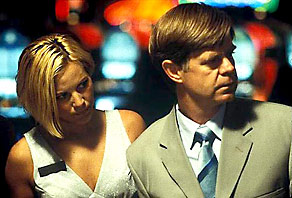![[Deep Focus]](../../flicker/longo.gif)

Casino lites.
![[Deep Focus]](../../flicker/longo.gif)
|
|
| The Cooler |
|
 |
B- |
|
Casino lites. |
|
|
Movie Credits: Directed by Wayne Kramer Written by Kramer and Frank Hannah Cinematography by Jim Whitaker Edited by Arthur Coburn Starring William H. Macy, Maria Bello and Alec Baldwin USA, 2003 Aspect ratio: 1.85:1 Screened 9/17/03 at Magno 1, New York, NY Reviewed 9/28/03 |
As The Cooler opens, William H. Macy seems to exist in a state of emotional anesthesia. He sets about his job with grim resignation. The concept employed here is one of the more intriguing I can remember - as a "cooler," Macy is a born loser. Employed by Alec Baldwin, the owner of an aging traditional Las Vegas casino, his task is to identify tables where gamblers are on a roll and just sort of brush up against them, killing their winning streak. You could think of him as the down-and-out counterpart of those countenance-raising angels from Wings of Desire, a loser consigned to looking over the shoulders of winners. Given the old-school Vegas setting, it can't be any surprise that there's a cocktail waitress (Maria Bello) involved (this movie isn't about surprises) and The Cooler eventually becomes a story of love sweet love, as she pulls Macy out of his metaphysical funk - to the ultimate consternation of Baldin, who realizes that a cooler who's actually getting laid doesn't have such a chilling effect on the fortunes of casino patrons. The resulting tension is alternately punctuated and defused by bursts of brutal violence and tender lovemaking. It's the latter that caused director Wayne Kramer some trouble, with a scene indirectly depicting Macy performing oral sex on Bello drawing fire from the MPAA, which slapped the picture with an NC-17 until Kramer agreed to jettison a bare 1.5 seconds of footage. (The unedited version was screened for critics.) What seems revealing of the MPAA's mindset is not necessarily the content of that snippet of film - you see Macy's head moving past Bello's pubic hair - but the content of the longer shot that immediately precedes it, which holds on the face of a woman who's clearly experiencing intense pleasure. I don't think it's coincidental that a similar shot was among the bits and pieces edited from Basic Instinct to secure a rating for that film. It begs the question: what does the MPAA have against cunnilingus anyway? The trim may seem inconsequential in its relation to the picture as a whole, but it's still a damned shame because Kramer went so far out of his way to depict imperfect adults having imperfect, but perfectly fulfilling, sex. Now, I don't mean to suggest that either of these people are anything but lovely in this film, but the 52-year-old Macy and the 35-year-old Bello are allowed to look the majority of their ages, which remains rare in American cinema. The film strives for intimacy not just in the depiction of sex, which is only somewhat explicit, but in its urge to achieve intimacy with the characters, requiring a lack of self-consciousness from its actors. In one scene, the nude Bello is photographed in close-up, surrounded by darkness and with her skin, lit a soft orange, sliding in and out of focus; as the camera jibs downward, Macy sits up in bed, moving into frame behind her. It's a scene of great tenderness that immediately follows a disconcerting burst of violence. In this scene and elsewhere in the film, Jim Whitaker's widescreen photography has a depth and grain that, along with apparently effortless tracking shots and Steadicam moves, bolsters the old-fashioned "movie movie" feel of the picture. When I say "old-fashioned," I'm referring to the late 1960s and early 1970s, an era that seems to be coveted by the filmmakers in the same way it is by Baldwin's casino boss, who is seen in one shot smashing up a mock-up of a Stephen Wynn-style Vegas resort that the moneymen recommend he build to replace his funky building, or by Macy, whose record collection seems to consist, unassumingly, of Rat Pack standards. If The Cooler doesn't make the most of its intriguing premise, it's the fault of a scenario that hews close to indie formula - the intent may be to stir the audience up, but the mix of character-driven love story with explosions of gritty violence itself is a cliché. Macy settles comfortably into a role that may as well have been written for him; his presence on the screen is simultaneously iconic and unprepossessing. Bello has played something close to this role before, in Permanent Midnight, and she remains quite appealing in it, albeit with a face that's perhaps a little too demonstrative for the big screen. Baldwin, meanwhile, proved in Glengarry Glen Ross that he's perfectly capable of playing this sort of heavy, and an over-the-top bathroom monologue toward the end of the film that he delivers with mad relish had me laughing aloud. The obvious intention here was to create a quirky, fanciful yarn about the power of love, and I suppose director Wayne Kramer and his co-screenwriter Frank Hannah do achieve that. But I also enjoyed The Cooler on a level that I doubt occurred to them - as a satire on the idea that some corporate managers still seem to have about an unhappy worker being a productive worker: An employee with an empty home life remains all the more focused on the job, unhappy though it may be, while a worker bee who's fallen in love is giddy, distracted, daydreaming. For businessmen in Vegas and elsewhere, the complications introduced by human feelings can be disastrous. |
 http://www.deep-focus.com/dfweblog/
bryant@deep-focus.com
http://www.deep-focus.com/dfweblog/
bryant@deep-focus.com